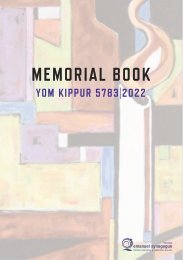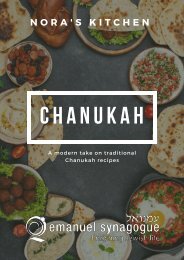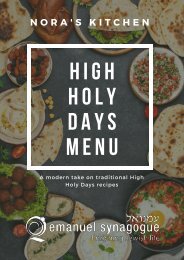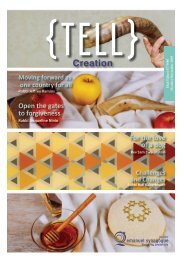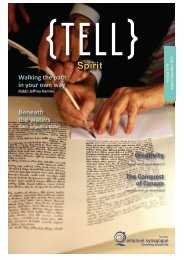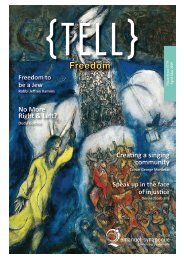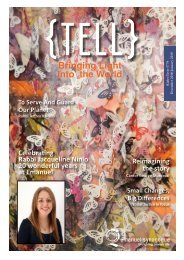TELL - December 2019 - February 2020
TELL - the magazine of Emanuel Synagogue, Sydney The Identity issue
TELL - the magazine of Emanuel Synagogue, Sydney
The Identity issue
You also want an ePaper? Increase the reach of your titles
YUMPU automatically turns print PDFs into web optimized ePapers that Google loves.
But that is a man’s name. When
are you ever called by that name?”
“When I am called to the
Torah,” I respond.
“And how often is that?” one
of the six rabbis asked, with
a small involuntary smirk.
“Regularly,” I respond,
with a voluntary one.
“So, you are Danielle, called
Donna, daughter of Arieh Leib
ben Itzhok Meyer, called Lionel.
Now is that Linel, or Lionel? How
is it pronounced?” We went over
the options and decided on Linel.
The ‘o’ is silent. Later I thought to
myself—‘Whether the angels were
weeping or not I knew not, but
there was one thing for certain, they
knew who stood before them.’
He dipped the feathered tip into ink
and with profound care and beauty,
wrote the document to sever the
union formed in heaven. It took
him hours. Whilst waiting, I took
26
down a book from the Rabbi’s shelf
about divorce. It spoke of marriage
as being the very closest two people
can come to God; it spoke of
spiritual perfection. And it said that
if two people are not happy, are not
able to achieve even a glimpse of
this enlightenment, then to God
it is like sacrilege. Two people are
not expected to suffer together;
it is like an insult to the vision of
God. And I held the book to my
heart, and gave thanks for such
nourishment and understanding.
We tried. We ran around with
cupped hands, cloths, and buckets
to collect the water pouring in. We
held down the tent flaps to stop the
wind, held fast to the poles in the
ground. “May this be the worst that
happens to you,” blessed the Rabbi.
My mother spat three times, to
keep away the Chora, the evil eye.
Twenty years later I cupped
my hands to catch the folded
parchment, inscribed with the
holy invocation that was to be
served to the Heavenly Court. And
he pronounced the words that were
served to him by the Rabbi, “I
divorce you, I divorce you, I divorce
you”. As we both choked on the
tears, a love, long buried beneath
the darkened clouds and thunderous
storms, shone out, so that we were
severed in love. And when I looked
up, I saw the eyes of the Rabbis also
brimmed with tears, and knew that
the heavens too wept, to see love
reborn for an instant— in the primal
cycle of life and death and life.
Tucked beneath my right arm, I
placed the holy decree and “walked
towards my independence” as
instructed. And finally, the Rabbi
held my hands in his and wished me
love and fulfillment and future joy.
The sun re-emerged, reflecting like
jewels in the puddles and raindrops
that hung on the leaves. The air
was clear, not heavy, not even hot.
The tables were dried, the cakes
and coffee brought out. A gentle
breeze blew, as if a blessing had
descended upon the day after all.
And there were many fertile years,
with babies born and chickens in the
yard. Tree planting, shared Shabbat
evenings, friendships and learning.
I sit now at times, at an empty
Shabbat table, and wonder if the
Shekhinah has deserted me. At
other times, at communal dinners
I sit and endure the loss of hearing
husbands declare their wives ‘women
of valour’. Sometimes the bed aches
with emptiness, and I close my eyes
to imagine gentle breath beside me.
Despite this, I still feel carried by the
wise shoulders of the rabbis, who
knew how to sever love with love.
Soon, I will visit that old, officious
woman again, and walk naked into
the living waters to her blessings;
hold my breath to sink and then
emerge towards a new beginning,
gving honour to the primal cycle
of life and death and life.



